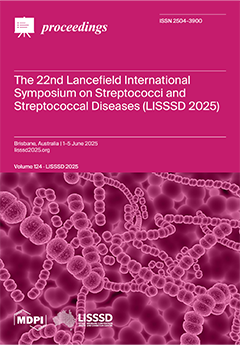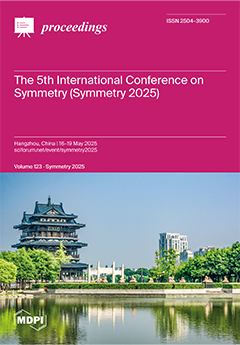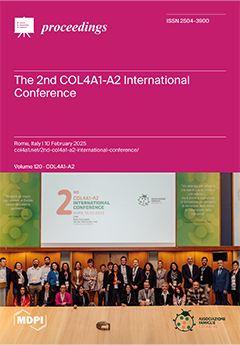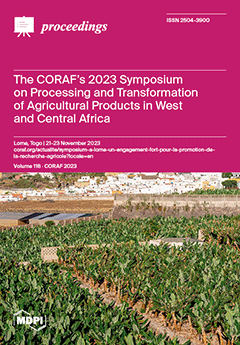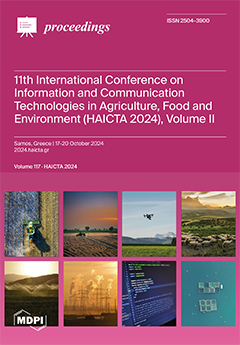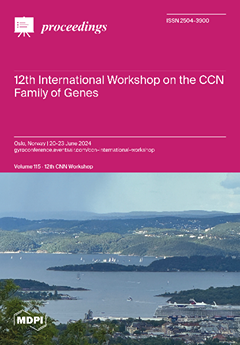Journal Description
Proceedings
Proceedings
is an open access journal dedicated to publishing findings resulting from conferences, workshops, and similar events. The conference organizers and proceedings editors are responsible for managing the peer-review process and selecting papers for conference proceedings.
Latest Articles
Check4Strep: A Community-Based Pilot Project to Understand and Respond to Infection with Group A Streptococcus
Proceedings 2025, 124(1), 23; https://doi.org/10.3390/proceedings2025124023 - 26 Aug 2025
Abstract
Background: ‘Check4Strep’ is a community-based, participatory action research (PAR) pilot study in a remote northern territory community [...]
Full article
(This article belongs to the Proceedings of The 22nd Lancefield International Symposium on Streptococci and Streptococcal Diseases (LISSSD 2025))
Open AccessProceeding Paper
General Theory of Information and Mindful Machines
by
Rao Mikkilineni
Proceedings 2025, 126(1), 3; https://doi.org/10.3390/proceedings2025126003 - 26 Aug 2025
Abstract
►▼
Show Figures
As artificial intelligence advances toward unprecedented capabilities, society faces a choice between two trajectories. One continues scaling transformer-based architectures, such as state-of-the-art large language models (LLMs) like GPT-4, Claude, and Gemini, aiming for broad generalization and emergent capabilities. This approach has produced powerful
[...] Read more.
As artificial intelligence advances toward unprecedented capabilities, society faces a choice between two trajectories. One continues scaling transformer-based architectures, such as state-of-the-art large language models (LLMs) like GPT-4, Claude, and Gemini, aiming for broad generalization and emergent capabilities. This approach has produced powerful tools but remains largely statistical, with unclear potential to achieve hypothetical “superintelligence”—a term used here as a conceptual reference to systems that might outperform humans across most cognitive domains, though no consensus on its definition or framework currently exists. The alternative explored here is the Mindful Machines paradigm—AI systems that could, in future, integrate intelligence with semantic grounding, embedded ethical constraints, and goal-directed self-regulation. This paper outlines the Mindful Machine architecture, grounded in Mark Burgin’s General Theory of Information (GTI), and proposes a post-Turing model of cognition that directly encodes memory, meaning, and teleological goals into the computational substrate. Two implementations are cited as proofs of concept.
Full article
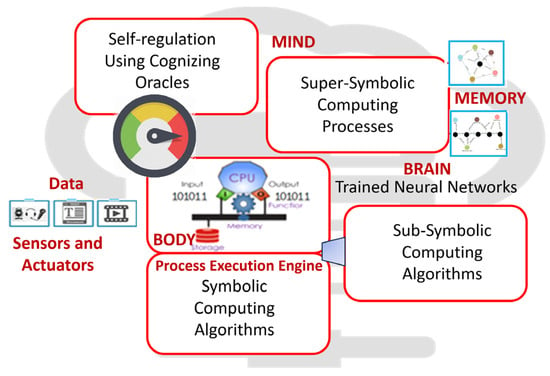
Figure 1
Open AccessAbstract
Low-Dose Interleukin-2 Therapy: A Transformative Approach for the Management of Autoimmune Complications Associated with Streptococcus pyogenes Infections
by
Ailin Lepletier, Rukshan Ahamed Mohamed Rafeek, Despena Vedis, Harshi Weerakoon, Natkunam Ketheesan, Michael F. Good and Manisha Pandey
Proceedings 2025, 124(1), 21; https://doi.org/10.3390/proceedings2025124021 - 22 Aug 2025
Abstract
Acute rheumatic fever is an autoimmune inflammatory reaction to Streptococcus pyogenes infections, leading to progressive heart valve damage and rheumatic heart disease (RHD) [...]
Full article
(This article belongs to the Proceedings of The 22nd Lancefield International Symposium on Streptococci and Streptococcal Diseases (LISSSD 2025))
Open AccessAbstract
Genomic Surveillance of Streptococcus pneumoniae and Streptococcus pyogenes in the Czech Republic in the Post-COVID-19 Era
by
Sandra Vohrnová, Renáta Veselá and Jana Kozáková
Proceedings 2025, 124(1), 20; https://doi.org/10.3390/proceedings2025124020 - 18 Aug 2025
Abstract
Aim: The aim of this study is to assess the impact of COVID-19 on the incidence and molecular epidemiology of invasive infections caused by Streptococcus pneumoniae (IPD) and Streptococcus pyogenes (iGAS) in the Czech Republic (CR) [...]
Full article
(This article belongs to the Proceedings of The 22nd Lancefield International Symposium on Streptococci and Streptococcal Diseases (LISSSD 2025))
Open AccessAbstract
Delineating Humoral and Cellular Immune Responses Induced by a Peptide-Based Vaccine for Protection Against Streptococcus pyogenes
by
Despena Vedis, Ailin Lepletier, Victoria Ozberk, Simone Reynolds, Ainslie Calcutt, Darrell Bessette, Michael F. Good and Manisha Pandey
Proceedings 2025, 124(1), 19; https://doi.org/10.3390/proceedings2025124019 - 18 Aug 2025
Abstract
Despite the substantial burden of Streptococcus pyogenes infections and their associated sequalae, there is currently no Strep A vaccine [...]
Full article
(This article belongs to the Proceedings of The 22nd Lancefield International Symposium on Streptococci and Streptococcal Diseases (LISSSD 2025))
Open AccessAbstract
Human Antibodies to M-Protein Epitope-Based Vaccines Demonstrate Increased Immunogenicity and Streptococcus pyogenes (StrepA) Bactericidal Activity
by
Christie T. M. Short, Vanessa Meier-Stephenson, Victoria Ozberk, Ainslie Calcutt, Simone Reynolds, Ijeoma Ogbuehi, Avi Seth, Kelly Kim, Michael Hawkes, Gregory J. Tyrrell, D. Lorne Tyrrell, Michael Houghton, Manisha Pandey and Michael F. Good
Proceedings 2025, 124(1), 18; https://doi.org/10.3390/proceedings2025124018 - 18 Aug 2025
Abstract
The high antigenic diversity of Streptococcus pyogenes (StrepA) presents extensive challenges to vaccine development; however, cryptic epitopes—conserved across emm types—offer an alternative approach [...]
Full article
(This article belongs to the Proceedings of The 22nd Lancefield International Symposium on Streptococci and Streptococcal Diseases (LISSSD 2025))
Open AccessProceeding Paper
The Evolution of Intelligence from Active Matter to Complex Intelligent Systems via Agent-Based Autopoiesis
by
Gordana Dodig-Crnkovic
Proceedings 2025, 126(1), 2; https://doi.org/10.3390/proceedings2025126002 - 18 Aug 2025
Abstract
Intelligence is a central topic in computing and philosophy, yet its origins and biological roots remain poorly understood. The framework proposed in this paper approaches intelligence as the complexification of agency across multiple levels of organization—from active matter to symbolic and social systems.
[...] Read more.
Intelligence is a central topic in computing and philosophy, yet its origins and biological roots remain poorly understood. The framework proposed in this paper approaches intelligence as the complexification of agency across multiple levels of organization—from active matter to symbolic and social systems. Agents gradually acquire the capacity to detect differences, regulate themselves, and sustain identity within dynamic environments. Grounded in autopoiesis, cognition is reframed as a recursive, embodied process sustaining life through self-construction. Intelligence evolves as a problem-solving capacity of increasing organizational complexity: from physical self-organization to collective and reflexive capabilities. The model integrates systems theory, cybernetics, enactivism, and computational approaches into a unified info-computational perspective.
Full article
Open AccessAbstract
Pericardial Effusion in Acute Rheumatic Fever and Rheumatic Heart Disease
by
Tehmina Kazmi, Omeir Aziz, Humera Javed, Ansar Nawaz, Ndate Fall, Craig Sable and Masood Sadiq
Proceedings 2025, 124(1), 22; https://doi.org/10.3390/proceedings2025124022 - 15 Aug 2025
Abstract
Background: Pericardial effusion in ARF has been described in 5–10% of patients, but contemporary data is sparse [...]
Full article
(This article belongs to the Proceedings of The 22nd Lancefield International Symposium on Streptococci and Streptococcal Diseases (LISSSD 2025))
Open AccessAbstract
GAS Regulation of Zinc Homeostasis During Skin and Soft Tissue Infection
by
Reid Wilkening, Lindsey Burcham, Laura Cook and Alexander Horswill
Proceedings 2025, 124(1), 17; https://doi.org/10.3390/proceedings2025124017 - 15 Aug 2025
Abstract
Streptococcus pyogenes (Group A Streptococcus, GAS) is an enigmatic human-restricted pathobiont, capable of both colonization and infection [...]
Full article
(This article belongs to the Proceedings of The 22nd Lancefield International Symposium on Streptococci and Streptococcal Diseases (LISSSD 2025))
Open AccessAbstract
Incidence of Invasive Group A Streptococcal Infections and Comparison of emm Types from Carriage, Pharyngitis, and Invasive Infections in Indigenous Communities in the Southwest United States
by
Catherine G. Sutcliffe, Victoria M. Sergent, Joyselynn Pitalua, Sopio Chochua, Christopher J. Gregory, Chloe Hurley, Zhongya Li, Saundra Mathis, Lesley McGee, Jennifer Onukwube Okaro, Theresa Tran, Robert Weatherholtz and Laura L. Hammitt
Proceedings 2025, 124(1), 16; https://doi.org/10.3390/proceedings2025124016 - 15 Aug 2025
Abstract
Background: Indigenous communities are disproportionately affected by group A Streptococcus (GAS) infections [...]
Full article
(This article belongs to the Proceedings of The 22nd Lancefield International Symposium on Streptococci and Streptococcal Diseases (LISSSD 2025))
Open AccessAbstract
Differential Immune Response in Children to Throat Specialist Versus Generalist Group A Streptococci
by
Debra E. Bessen, Jeanne M. DiChiara, Freda F. Tei, Ji Ho Lee, Ari Shechtman, Shivaleela Keerthy, Suchitra Bhattacharjee, Luiza Karrer and Sang Ho Lee
Proceedings 2025, 124(1), 11; https://doi.org/10.3390/proceedings2025124011 - 15 Aug 2025
Abstract
Background: The antigenic heterogeneity of GAS poses a challenge for vaccine design [...]
Full article
(This article belongs to the Proceedings of The 22nd Lancefield International Symposium on Streptococci and Streptococcal Diseases (LISSSD 2025))
Open AccessAbstract
The Veituberi Approach Transforming RHD Through Patient Leadership and Lived Experience
by
Erini Kala, Marika Yalimaiwai, Maria Mow, Jimaima Kailawadoko-Matanaicake and Joseph Kado
Proceedings 2025, 124(1), 14; https://doi.org/10.3390/proceedings2025124014 - 14 Aug 2025
Abstract
Rheumatic heart disease (RHD), a complication of untreated Strep A infections, is a major global health concern [...]
Full article
(This article belongs to the Proceedings of The 22nd Lancefield International Symposium on Streptococci and Streptococcal Diseases (LISSSD 2025))
Open AccessAbstract
Contemporary Clinical Characteristics and Presentation of ARF Globally
by
Omeir Aziz, Tehmina Kazmi, Humera Javed, Ndate Fall and Masood Sadiq
Proceedings 2025, 124(1), 15; https://doi.org/10.3390/proceedings2025124015 - 13 Aug 2025
Abstract
Background: Acute rheumatic fever (ARF) is a significant public health concern in resource-limited settings, but its clinical presentation remains inadequately described [...]
Full article
(This article belongs to the Proceedings of The 22nd Lancefield International Symposium on Streptococci and Streptococcal Diseases (LISSSD 2025))
Open AccessAbstract
Pacific Adaptation of Tools for Implementing Rheumatic Heart Disease Control Programmes (TIPs)
by
Jessica N. Daw, Rosemary Wyber and Joseph H. Kado
Proceedings 2025, 124(1), 13; https://doi.org/10.3390/proceedings2025124013 - 13 Aug 2025
Abstract
In 2013, the framework ‘Tools for Implementing Rheumatic Heart Disease (RHD) Control Programmes’ (TIPs) was published [...]
Full article
(This article belongs to the Proceedings of The 22nd Lancefield International Symposium on Streptococci and Streptococcal Diseases (LISSSD 2025))
Open AccessAbstract
Prevalence, Risk Factors, and Strain Distribution of Group A Streptococcus Carriage Among Indigenous Children in the Southwest United States
by
Catherine G. Sutcliffe, Victoria M. Sergent, Joyselynn Pitalua, Sopio Chochua, Christopher J. Gregory, Chloe Hurley, Zhongya Li, Saundra Mathis, Lesley McGee, Jennifer Onukwube Okaro, Theresa Tran, Robert Weatherholtz and Laura L. Hammitt
Proceedings 2025, 124(1), 12; https://doi.org/10.3390/proceedings2025124012 - 13 Aug 2025
Abstract
Background [...]
Full article
(This article belongs to the Proceedings of The 22nd Lancefield International Symposium on Streptococci and Streptococcal Diseases (LISSSD 2025))
Open AccessProceeding Paper
Jean Piaget and Objectivity—Genetic Epistemology’s Place in a View from Nowhere
by
Mark A. Winstanley
Proceedings 2025, 126(1), 1; https://doi.org/10.3390/proceedings2025126001 - 13 Aug 2025
Abstract
Science pursues objectivity. According to Thomas Nagel, “we must get outside of ourselves, and view the world from nowhere within it” is the most natural expression of this goal. However, we cannot literally get outside of ourselves; realistically, we can only hope to
[...] Read more.
Science pursues objectivity. According to Thomas Nagel, “we must get outside of ourselves, and view the world from nowhere within it” is the most natural expression of this goal. However, we cannot literally get outside of ourselves; realistically, we can only hope to achieve a more detached conception by relying “less and less on certain individual aspects, and more and more on something else, less individual, which is also part of us”. This “self-transcendent conception should ideally explain (1) what the world is like; (2) what we are like; (3) why the world appears to beings like us in certain respects as it is and in certain respects as it isn’t; (4) how beings like us can arrive at such a conception.” The natural and human sciences address (1)–(3), but the last condition is rarely met, according to Nagel. In this paper, I argue that the genetic epistemology conceived by Jean Piaget as a science of the growth of knowledge explains how beings like us meet condition (4).
Full article
Open AccessAbstract
Addressing Rheumatic Heart Disease in the Pacific
by
Joseph H. Kado, Jessica N. Daw, Christine Everest and Rosemary Wyber
Proceedings 2025, 124(1), 7; https://doi.org/10.3390/proceedings2025124007 - 12 Aug 2025
Abstract
Background/Purpose: Pacific leaders have articulated addressing rheumatic heart disease (RHD) as a Pacific health priority [...]
Full article
(This article belongs to the Proceedings of The 22nd Lancefield International Symposium on Streptococci and Streptococcal Diseases (LISSSD 2025))
Open AccessProceeding Paper
Role of a Natural Antioxidant in the Secondary Shelf Life of Ready-to-Use Meat Pâté
by
Beatrice Sordini, Sonia Esposto, Arianna Bonucci, Ilenia Dottori, Luigi Daidone, Stefania Urbani, Gianluca Veneziani, Roberto Selvaggini, Maurizio Servili, Davide Nucciarelli and Agnese Taticchi
Proceedings 2025, 119(1), 10; https://doi.org/10.3390/proceedings2025119010 - 11 Aug 2025
Abstract
►▼
Show Figures
By-products from the agro-food industry can be natural ingredients for reformulating traditional foods, enhancing quality, extending secondary shelf life (SSL), and reducing food waste. This study evaluates the impact of an olive vegetation water phenolic extract (OVWPE) at two concentrations on ready-to-use meat
[...] Read more.
By-products from the agro-food industry can be natural ingredients for reformulating traditional foods, enhancing quality, extending secondary shelf life (SSL), and reducing food waste. This study evaluates the impact of an olive vegetation water phenolic extract (OVWPE) at two concentrations on ready-to-use meat pâté (MP1 and MP2) under simulated retail storage. We evaluated the phenolic composition, volatile compounds, antioxidant activity, and sensory quality of the OVWPE-added pâté and compared it to the control sample (CTRL; without antioxidant). Results indicated that OVWPE minimized oxidation products, enhancing lipid stability, and also reduced the formation of C6–C9 aldehydes linked to rancid off-flavor. Without sensory defects, the OVWPE pâtés showed higher antioxidant activity and α-tocopherol content than the CTRL. OVWPE appears to be a promising antioxidant of natural origin for food formulations, supporting SSL extension and food waste reduction.
Full article

Figure 1
Open AccessConference Report
Proceedings of the 13th Alcohol Hangover Research Group Meeting in Dresden, Germany
by
Emina Išerić, Anne S. Boogaard, Gillian Bruce, Jacqueline M. Iversen, Analia Karadayian, Andy J. Kim, Darren Kruisselbrink, Marlou Mackus, Agnese Merlo, Ann-Kathrin Stock, Jakub Urbański, Benthe R. C. van der Weij and Joris C. Verster
Proceedings 2025, 122(1), 2; https://doi.org/10.3390/proceedings2025122002 - 11 Aug 2025
Abstract
These proceedings summarize the presentations of the 13th Alcohol Hangover Research Group meeting held 20–22 April 2023 in Dresden, Germany. The purpose of this annual meeting is to discuss current research on the causes, consequences and treatment of alcohol hangover, to network, and
[...] Read more.
These proceedings summarize the presentations of the 13th Alcohol Hangover Research Group meeting held 20–22 April 2023 in Dresden, Germany. The purpose of this annual meeting is to discuss current research on the causes, consequences and treatment of alcohol hangover, to network, and to establish future research collaborations. Various topics of interest were presented and discussed, including the impact of anxiety and personality on susceptibility for experiencing hangovers, sleep, the impact of the COVID-19 pandemic, the role of inflammation and alcohol metabolism in the pathology of alcohol hangover, novel treatments, and the changing regulatory landscape for hangover solutions.
Full article
Open AccessAbstract
Genomic Characterization and Classification of Streptococcus oralis Using Next-Generation Sequencing
by
Ghiwa Chalhoub, Rayane Adam, Carmen Adam, Carni Boujanian, Rita Menhem, Peter Saba, Nancy Al Boustany, Charbel Al Khoury, Edmond Abboud, Rodrigue Saad and Sima Tokajian
Proceedings 2025, 124(1), 10; https://doi.org/10.3390/proceedings2025124010 - 8 Aug 2025
Abstract
Streptococcus oralis is an alpha-hemolytic, Gram-positive bacterium from the viridans group streptococci (VGS) [...]
Full article
(This article belongs to the Proceedings of The 22nd Lancefield International Symposium on Streptococci and Streptococcal Diseases (LISSSD 2025))
Highly Accessed Articles
Latest Books
E-Mail Alert
News
Topics


